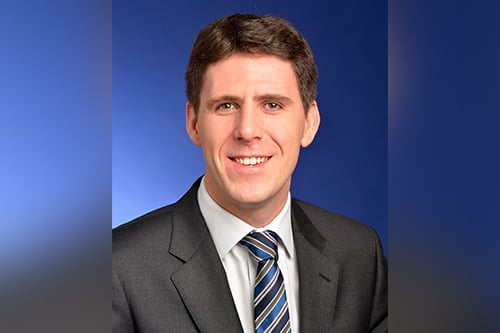

In his role as director of insurance at KPMG, Matt Francis (pictured) focuses on insurance regulation and his daily responsibilities involve advising clients on the complex subjects of capital, governance and regulatory reporting. Up until about four years ago, he said, he was very much involved with the implementation of Solvency II but shortly after this came into being, Brexit occurred and since then he has spent the last three and a half years working on Brexit projects.
These projects include trying to help companies in the UK trying to set up subsidiaries overseas, he said, but also advising European firms accessing the UK market on how to maintain their structures and on what changes they need to instigate to ensure their compliance following Brexit. There were a good number of UK firms who knew the day after the referendum that it would cause challenges to their existing models, Francis commented, and who have spent the last three and a half years preparing their structures to be Brexit ready.
Most of these businesses set up subsidiaries overseas and moved parts of their business from one entity to another, he said, while obtaining the right regulatory permissions to ensure that they are in an advantageous position. However, he outlined, there are a number of operational aspects which have affected certain parts of the market more heavily including the motor insurance ‘green card’ and the ‘European Health Insurance Card’ (EHIC).
“[The EHIC] has been an area where firms have tried to understand what the implications are for their customers to ensure that their products are suitable,” he said, “and to provide them with the right amount of coverage and protection.”
The EHIC allows UK citizens to access state-provided health care during a temporary stay in another European country either in the EU, Norway, Iceland, Liechtenstein or Switzerland, Francis said, and provides a significant amount of protection to citizens. The UK has issued around 27 million EHICs to date, he said, and in recent years, travellers have claimed £150 million through the EHIC.
Access to the EHIC will continue without change until the transition phase ends, he said, but the big question for travellers and their insurance companies is what will occur when this is finished, as there is uncertainty as to what arrangements will be made to replace this card. It is important to note, Francis said, that the EHIC is not a substitute for travel insurance as the EHIC will cover pre-existing conditions which most travel insurance policies will not. Another key differential, he said, is that the EHIC will not cover bills for treatment in private medical facilities or provide emergency repatriation.
“Customers need to understand what cover they require and need,” he said, “and to make sure they have the right things in place, just in case.”
Some insurers have been very good at communicating with their customers, Francis said, and are advising clients through dedicated websites and their call centres, and are making sure that they have the right staff in place with the appropriate skills, expertise and knowledge of the situation to offer advice. Not all insurance companies are in the same place, however, when it comes to dealing with this situation, he said, and it has become clear that some simply do not know what will happen when the transition period ends.
Insurers need to help customers to make better informed decisions, he said, and they need to be aware of their customers’ needs and circumstances, and able to flag what their travel insurance policy covers. He highlighted a recent ABTA survey which found that 21% of the British public do not take out travel insurance ahead of a holiday, either thinking that it is not necessary or that they are willing to take the risk. This is clearly an area that insurers should draw their customers attention to when selling their policy, he said.
“Brokers have a very important role to play in understanding both their client requirements and needs,” Francis said, “but also in understanding the exact level of protection and cover travel insurance can provide and to make sure that the product that they recommend is fit to meet the traveller’s needs.”
Beyond the consumer harm element of the EHIC, Francis detailed the impact that not being able to rely on this option is going to have on insurance companies and the levels of claims that they will be experiencing. While the UK government has previously said that it wants to retain the system, he said, only a handful of other countries have indicated the same intention. Many insurers have already started to factor in the loss of the EHIC into their underwriting and pricing decisions, he said, and this has been further complicated by the different healthcare systems of various countries.
Some travel insurers have expressed concerns that the EHIC replacement hasn’t been prioritised and doesn’t seem to be featuring near the top of the negotiating mandate that the UK and the EU have, he said, with other topics such as fishing rights and trading tending to dominate the discussion. The timeline to the negotiations will be tight, he said, and it seems to these insurers that the pressing and real concern of the EHIC is simply not being included in this mandate.
